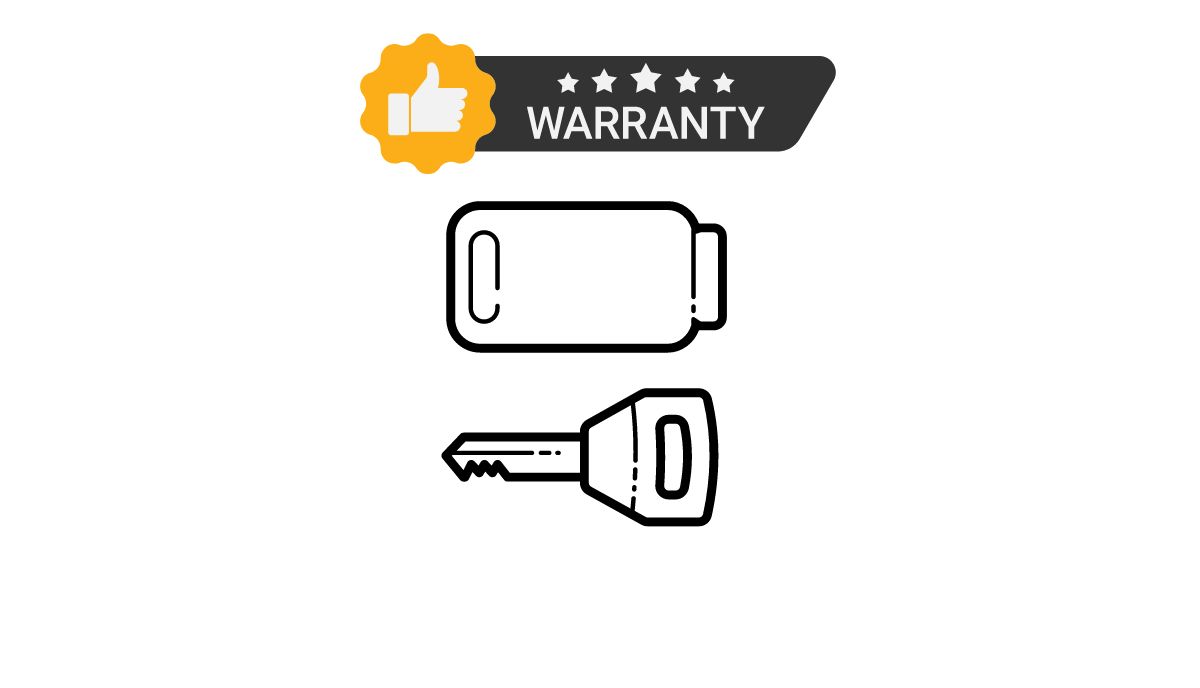Yes, most warranties cover the key fob and its batteries. That includes car brands that appear to neglect them. Ford is a prominent example. The basic warranty exempts the key fob completely.
Chrysler is in a similar boat. According to this Chrysler guide, you need a Maximum Care Warranty to secure coverage for the key fob and its battery. The exact details may vary with each brand, which is why you should consult the manufacturer beforehand.
| BRAND | KEY FOB BATTERY COVERED OR NOT |
| TOYOTA | YES |
| FORD | YES |
| CHEVROLET | YES |
| HONDA | YES |
| NISSAN | YES |
| JEEP | YES |
| HYUNDAI | YES |
| SUBARU | YES |
| VOLKSWAGEN | YES |
| BMW | YES |
How To Check If Key Fob Batteries Are Covered Under Warranty?
To make sense of the type of coverage you can expect, you should first understand the factors surrounding the workings of a vehicle warranty:
1). Manufacturer Warranty Coverage

Car warranties are precisely what they sound like. A warranty is a form of insurance. It grants you free or cheap repairs and replacements when a vehicle develops faults. But warranties are not all-encompassing. They have rules:
- Every new car comes with a manufacturer’s warranty.
- Warranties have a limited lifespan. Most expire within three to five years.
- You can choose between two primary types of manufacturer warranties, namely bumper-to-bumper and powertrain.
- Bumper-to-bumper warranties cover every component in and around the vehicle. The key fob and its battery may fall within this category.
- Powertrain warranties are aptly named. They will repair or replace turbochargers, axles, and other powertrain parts. A powertrain warranty will not replace your key fob battery.
- Market Watch has noticed that luxury brands provide plans that combine bumper-to-bumper and powertrain warranties.
- Stated-component warranties are more comprehensive than powertrain plans. However, they don’t provide as much coverage as bumper-to-bumper warranties. These contracts will include a specific list of the components they cover. You may find the key fob and its batteries on that list.
- Consumer Reports has noticed that some brands offer corrosion and emissions warranties. You use corrosion warranties when a part rusts. Emissions warranties come into play when you want the car to pass an emissions test. Neither of these options matters to key fobs and their batteries. Although both components can rust.
- If you have an electric car, the manufacturer will offer a battery warranty. This cannot cover the key fob and battery.
- The paint surface warranty is equally unrelated to the fob. It comes into play when you need a paint job.
2). Vehicle Warranty Coverage

A manufacturer’s warranty will not cover maintenance services or items that naturally wear out over time. That includes tires and brake pads. Don’t expect the manufacturer to pay for oil changes and new coolant.
Key fob batteries are exempt because they are supposed to last a certain number of years. If the battery doesn’t appear on the list of covered items, check the warranty options on the manufacturer’s website. You can also consult the dealership.
You will most likely identify a plan that fits your needs. Consider Honda, which offers an Accessories Limited Warranty. According to Forbes, this plan is comprehensive enough to cover cosmetic pieces added after the fact.
If you sign up for their roadside assistance service, experts may replace your key fob battery for free in the field as part of the package. Read the fine print to understand the perks of your relationship with Honda.
What about used cars? The manufacturer’s warranty will continue to apply until it expires. You won’t invalidate the plan by selling the vehicle. Don’t buy a used car without confirming that it has a warranty. You should also check the terms and conditions.
Some dealerships will offer special warranties for their used cars. Others encourage consumers to buy warranties from third-party entities. Extended warranties are popular because of their flexibility.
First of all, many of them are transferable. Secondly, you have more freedom to select the shop that performs repairs and replacements when your key fob battery fails. Many drivers buy extended warranties for relatively new cars once the manufacturer’s warranty expires.
3). Battery Warranty Terms

Some brands cover the battery but not the key fob. Others mention the key fob but neglect the battery. You can successfully argue that a depleted battery counts as a key fob defect that fits within the warranty’s coverage. Make your case to the dealership and see what they say.
Most manufacturers place little or no emphasis on the batteries because the items are inexpensive. You can buy a pack for $10 or less. Many drivers don’t see the point of using a warranty to replace the battery.
4). Warranty Documentation

You determine whether a car has an active warranty by reviewing the documentation. If you don’t know where to find it, look at the buyer’s guide. According to Credit Karma, the Federal Trade Commission expects dealerships to give potential customers a buyer’s guide.
It tells you everything you need to know about the car, including the presence or absence of a warranty. You can’t return a car simply because you did not realize the warranty had expired. However, HG.org Legal Resources have noted that the Federal Trade Commission can fine dealerships $16,000 for failing to include a buyer’s guide that warns consumers about the warranty’s status.
Additionally, this Washington State Guide (Office of The Attorney General) has highlighted the presence of an implied warranty of merchantability. In other words, any vehicle a dealership sells should be safe, fit for driving, and free of significant defects. This obligates the dealership to perform repairs or replacements if they sell the driver a defective car.
Therefore, even without a manufacturer’s warranty, or an extended warranty, consumers that buy used cars have more protections than they realize. Dealerships can escape those liabilities by revealing a used car’s defects ahead of time. If the consumer decides to buy the vehicle despite these warnings, the implied warranty won’t apply.
Purchases from private parties are not protected. A driver is not obligated to offer warranties and guarantees when they sell their car.
5). Customer Service Inquiries

The most accurate way to determine whether a car has a warranty is to consult the dealership or manufacturer. But it isn’t enough to call them:
- First, they need help identifying your car. This means finding the vehicle’s VIN. Manufacturers are expected to place this number in several locations to simplify access. But mechanics usually find it on a plate under the hood. The VIN is unique to each vehicle.
- Secondly, you need to know whether the warranty has expired. Some warranty durations are measured in months or years. Others are based on mileage. For instance, if you have a 60,000-mile warranty, you should determine whether you’ve exceeded this limit by looking at the odometer.
- Once you have the relevant information, call the dealership. Send them the VIN and wait for a response. They will send your vehicle’s warranty details.
Don’t rely on the manual. It reveals the model year and manufacture date, which are not actually relevant because the warranty activates on the day you purchased the car. As such, you may assume your warranty has expired because you started counting from the manufacture date.
This is why Obvi has encouraged consumers to keep the bill of sale. You can refer to this document years later if you don’t remember the purchase date. With the bill of sale in hand, the manual can tell you whether the warranty can still cover the key fob battery.
If all else fails, drive the vehicle to the dealership. Let them find whatever they need. Once they locate the VIN, the dealership can tell you once and for all whether it covers the key fob battery. Remember that warranties tend to ignore faults that occur because of your actions.

